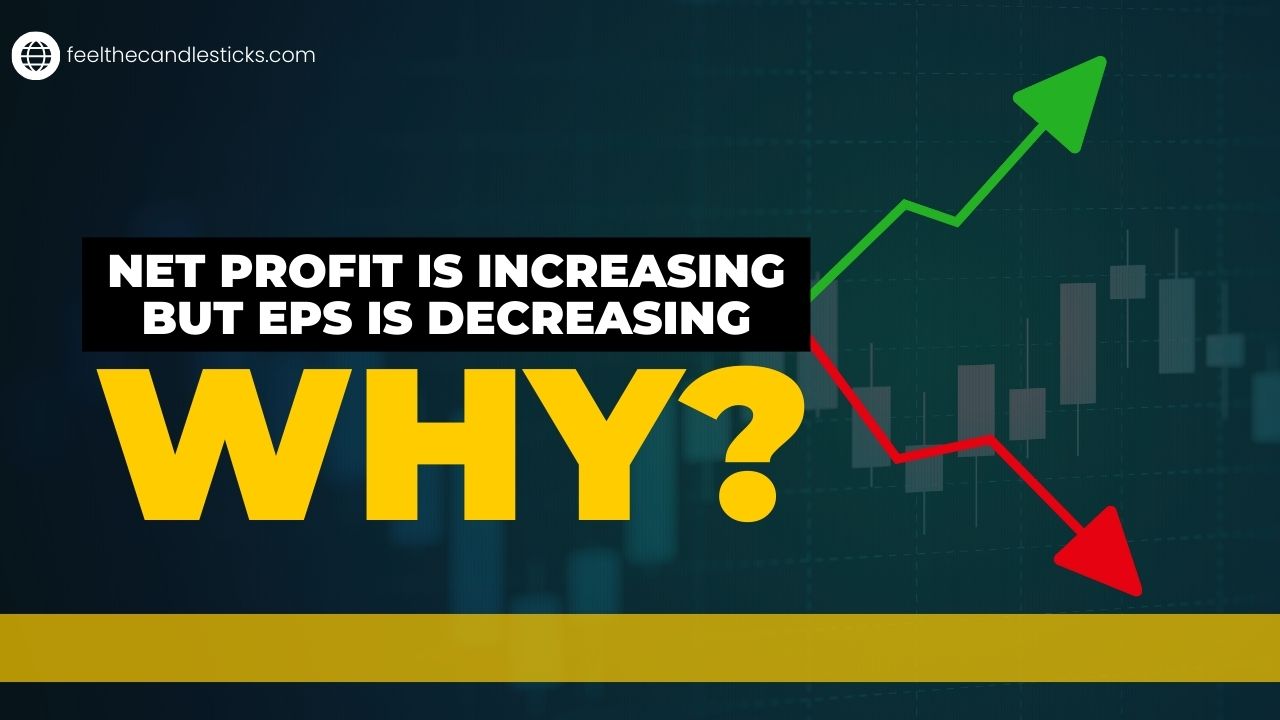When investing in stocks, two key financial metrics to keep an eye on are Net Profit and EPS (Earnings Per Share). These two are closely related, and logically, you would expect them to move in the same direction. However, there are times when a company’s Net Profit increases, but its EPS decreases. This might seem confusing, but there are several reasons why this happens. In this article, we’ll explore these reasons in simple terms.
Table of Contents
What is Net Profit?
Net Profit is the actual profit that a company makes after paying all its expenses, taxes, and other costs. It is often referred to as the “bottom line” because it’s the final figure on a company’s income statement. This is the amount of money that the company has earned after everything is paid for, and it’s an important indicator of the company’s financial health.
What is EPS?
EPS stands for Earnings Per Share. It is a way to measure how much profit a company makes for each share of its stock. To calculate EPS, you divide the company’s Net Profit by the total number of shares that are outstanding (owned by shareholders).
EPS (Earnings Per Share) Formula:
EPS = Net Profit / Outstanding Number of Shares
EPS is important because it gives investors an idea of how profitable a company is on a per-share basis.
The Relationship Between Net Profit and EPS
Since EPS is calculated using Net Profit, you would expect that if Net Profit increases, EPS should also increase. Similarly, if Net Profit decreases, EPS should decrease too. This is the general rule, but there are exceptions.
Why EPS Can Decrease Even When Net Profit Increases?
Dilution of Shares
Dilution of shares happens when the total number of a company’s shares increases. The number of shares increases, but it causes a reduction in the percentage value of ownership of each share. When this happens, even if the Net Profit goes up, the profit is spread across more shares, which can cause the EPS to go down. Here are some examples of how shares can be diluted:
ESOP (Employee Stock Option Plan)
- What It Is:
An ESOP is a program that gives employees the option to buy company shares at a fixed price. It’s a way to reward and motivate employees. - How It Causes Dilution:
When employees use their stock options to buy shares, the total number of shares increases. Since the same profit is now divided among more shares, the EPS can decrease.
QIP (Qualified Institutional Placement)
- What It Is:
A QIP is a way for companies to raise money by selling shares to large institutional investors, like mutual funds or insurance companies. They are also called qualified institutional buyers (QIBs). - How It Causes Dilution:
When a company issues new shares through a QIB, the number of total shares increases. This can dilute the EPS because the profit has to be shared among more shares.
Rights Issue
- What It Is:
A rights issue is when a company offers new shares to its existing shareholders at a lower price than the market value. This allows shareholders to buy more shares at a discount. - How It Causes Dilution:
When shareholders buy these new shares, the total number of shares increases. This increase can dilute the EPS since the profit is now divided among more shares.
FPO (Follow-on Public Offer)
- What It Is:
An FPO is when a company that is already listed on the stock exchange issues additional shares to the public. It’s similar to an IPO, but the company is already publicly traded. - How It Causes Dilution:
When a company offers more shares to the public, the total number of shares increases. Just like with a rights issue or QIB, this can dilute the EPS because there are more shares over which the profit is spread.
Conclusion
In summary, while Net Profit and EPS are closely related, they don’t always move in the same direction. An increase in the number of shares can cause EPS to decrease even when Net Profit is on the rise. Understanding these factors helps investors make better decisions by seeing the full picture of a company’s financial situation.
Also Read – What is Dividend? – Complete Guide in Simple Words

